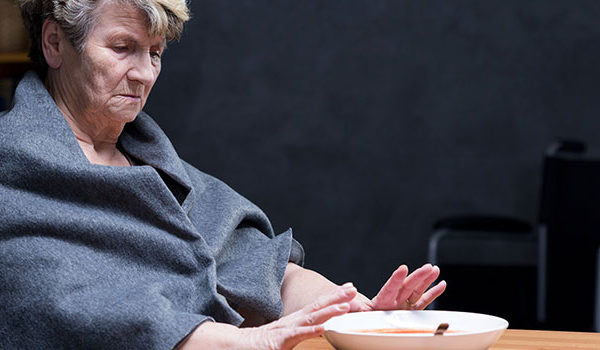Helpful tips for making mealtimes easier for dementia patients
Mealtimes are a time for you and the family to chat about the day, and enjoy some time together while also enjoying your food. Mealtimes can however become difficult for someone with dementia and this can mean that mealtimes can become stressful and unenjoyable occasions. There are strategies you can use for making mealtimes easier for dementia patients.
Mealtimes are a good way to help someone with dementia to keep track of time, so ensuring that you are consistent with timings as much as you can will help you keep to a routine. Routines are good for someone with dementia as it provides them with daily reference points. It is best to start this during the early stages of dementia and keep it going. You can also ensure that you create an enjoyable and relaxing atmosphere for them, turning off any televisions and radios. Although you might wish to try using some relaxing music.
You can help the person with dementia to feel a part of the meal preparation by letting them do some tasks like laying the table for example, or doing some of the food preparation. Mealtimes are also an opportunity to chat about things from the day, talk about the positives, like what has gone well that day. It’s important to also make sure that the person with dementia is getting the right nutrition.
Dementia presents many challenges as the disease progresses, such as:
- Sense of taste or smell may decrease
- Ability to prepare meals independently declines
- Chewing, swallowing and digesting food can become more difficult
- Medication can affect appetite
- Motor skills may decline meaning using cutlery can become harder
- Changes in perception can make it harder for the person to recognise the food
- Constipation
- Depression
Helping with appetite
If the person is experiencing a decreased appetite, then there are some things you can check, as well as things you can try to help increase it.
Ensure the food you are making is something they like – involve them in choosing the meals you will eat for the day or week.
Do they need a visit to the dentist? There may be an issue with dentures and tooth pain they have been unable to communicate to you.
Get the person to sit in the kitchen with you while you cook, and help them to get involved. The smells and sounds of cooking may stimulate their appetite.
Physical activity each day will help to keep a healthy appetite. This can be included in the daily routine as a ten minute bris walk a day, or some physical activity they enjoy.
Check if any medication can be reviewed to help.
Keeping things simple
People with dementia can have trouble with dealing with things that distract them or confuse them, so to make mealtimes an easier and more relaxing experience for them, you will need to make things simple.
Keep the dinner table free from distractions, a cluttered table may cause distress, as could items that are not related to eating.
Use plain plates, rather than ones with patterns on them and contrast the plate from the food. White food like mash or cauliflower on a white plate can make it difficult for someone with dementia to distinguish between the two.
Provide simple food without too may options, try and keep them involved with what food they would like, without over doing it with choices as this can cause confusion and frustration.
You might need to keep the table free of too many condiments and simply ask if the person would like sauce, gravy or salt etc, rather then having them all on the table. Offer only one at a time, rather than all at once.
Comfort considerations
There are various comfort factors you’ll need to think about as the person with dementia may be unable to consider these for themselves. Ensure that you observe the person and consider the following:
If the person with dementia is reacting badly to seeing the food on their plate, it could well be that they are experiencing visual perception difficulties and thinking some food is not what it actually is. Talk with them about the food and take them through what is on their plate, in a calm way. If it proves impossible to help them to understand what it is, remove it from their plate. Before a meal, ensure that they have been to the toilet.
Check in on how tired they might be. If they seem particularly worn out, due to a restless night for example, then keep food easy and simple.
Seating should be comfortable and supportive, providing a good upright posture for eating.
Temperature should be checked before serving food as someone with dementia may find it harder to judge this. They may even spit food out because of this – it’s not necessarily that they dislike the food.
Ensure there is ample lighting without glare or shadows that could cause confusion.
Remove any unnecessary noises like a television or radio, these should be switched off so that the person can focus on eating.
Give plenty of time for eating so that the person does not feel rushed.
Ensure that meals are nutritious and balanced with plenty of fibre. Constipation is a common ailment in someone with dementia.
Types of meals to help
Swallowing can become harder for someone with dementia and softer foods can help with this. Things like mashed potatoes or pasta can be a lot easier for them to eat.
If they are particularly tired then prepare a simple meal that is smaller and can be eaten faster.
If the person wakes up in the night hungry, have some healthy small snacks available for them. This can also help if they have forgotten that they have already had a meal.
Finger foods can help make mealtimes easier if they are beginning to experience difficulty with cutlery. Guiding and prompting
You may need to help the person to start eating by guiding their hand on the cutlery as a prompt. You will also have to remind the person to drink regularly as they may not remember to do this for themselves.
Further help
Keep in mind that you will need to do a bot of trial and error as the dementia progresses.
Dysphagia, the swallowing disorder, is a common development in people with dementia, ensure that you get help from a Speech and Language Therapist for this.
For help with handling cutlery and drinks glasses or cups, you can consult with an occupational therapist for items that will make things easier, helping the person to retain their independence for longer.




